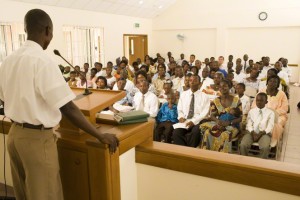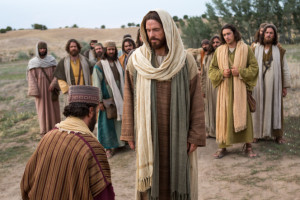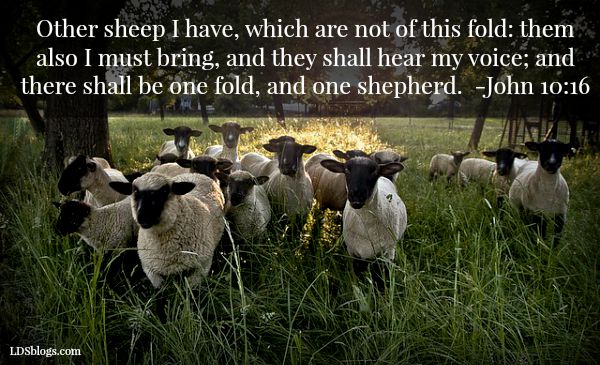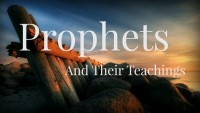This is a repost of an article previously posted on Mormonbasics.com.
Yes, I’m going to talk about pure religion, but first I need to discuss a matter of semantics or words we use when we talk about religion. Most people belong to one kind of social club or another. Social clubs can be the Rotarians, Kiwanis, a walk for cancer, a neighborhood board of some kind, or any one of a thousand other groups of people who have come together for a common cause. In these groups we all have our own reasons for belonging, but every group as a whole has an aim or mission it wants to accomplish. We buy into this mission to one degree or another to aid in the accomplishment of this goal.
Most people reading this post also belong to a religion, a group of like-minded people who have come together to accomplish certain aims or goals. All of us have our own personal reasons for belonging to our religion. We each have our own hope to get something out of our membership that may or may not meet the stated goals of our religion.
Social clubs and church membership can sometimes seem very much alike. Sometimes people get so involved in their personal charity work that their social interaction acts like a substitute for their religion. Their direction in life becomes set by themselves and their group rather than by a god or code of scripture. Many feel the good they accomplish in this way is as suitable or satisfying as what they may have found in any religion. I’m not here to argue that idea.
The difference between the two
 As I see it the difference between a social club and a religion is that the social club is completely self-defined and self-directed, while the religion is supposed to be defined and directed by God. Obviously this is not always true, since God would not define and direct His children to belong to such a vast and controversially different collection of churches. If God is at the head of His church there will be one way to run it, one main aim or goal of the church, and a right way to live so as to reach that aim or goal. I believe life really is just that simple. After all, Christ did say that there was to be only one fold and one shepherd. In John 10:16 Christ said to his apostles,
As I see it the difference between a social club and a religion is that the social club is completely self-defined and self-directed, while the religion is supposed to be defined and directed by God. Obviously this is not always true, since God would not define and direct His children to belong to such a vast and controversially different collection of churches. If God is at the head of His church there will be one way to run it, one main aim or goal of the church, and a right way to live so as to reach that aim or goal. I believe life really is just that simple. After all, Christ did say that there was to be only one fold and one shepherd. In John 10:16 Christ said to his apostles,
16 And other sheep I have, which are not of this fold: them also I must bring, and they shall hear my voice; and there shall be one fold, and one shepherd.
The LDS Church
As with any church there are rules of behavior and social expectations that go with being a member of the Church. When we are baptized we agree to attend our meetings, pay our tithing, and live the Word of Wisdom – no drinking, smoking or drugs, and eat healthy foods. I have discussed in other posts aspects of the culture of the Mormon Church and how our personal culture changes and is replaced with the culture of Christ over a period of time, sometimes taking several generations for the transformation to be complete. But is this all there is to our religion, just attending meetings and not smoking? Sadly, for many of us, yes, that is all we know, and that is all we ever really experience. We can have great experiences in the Church just by being obedient to the basic commandments and attending our meetings, but that still doesn’t move us much past the social club experience.
True religion
In the New Testament James says (James 1:27)
27 Pure religion and undefiled before God and the Father is this, To visit the fatherless and widows in their affliction, and to keep himself unspotted from the world.
The purpose of the LDS Church is not to be a social club, but to teach us how to practice pure religion, the kind of religion Jesus taught and lived. Yes, it is true, Jesus not only taught religion, but he lived what he taught, and he did it in the purest sense of the word. That is why he is our example in all things.
When you distill something you extract or pull out all the impurities, leaving only the purest, most concentrated parts behind. James 1:27 quoted above is the distillation of everything else we do in our religion, it is what is left over when you pull away all the “fluff” and trivial parts of our lives. This scripture boils all of religion down to two simple tasks, if you will. First, we are told to visit the fatherless and widows in their afflictions, and second, we are to keep ourselves unspotted from the world. Seems simple enough on the surface.
Visit the fatherless and widows
 The title of this section is incomplete. I left off the important part, in their affliction. If you have ever spent time working with those who cannot provide for themselves, you have seen a multitude of sufferings. Those who are poor are generally those who are afflicted as well. The poor are pushed down by policy, by those seeking to take advantage of them, by circumstances beyond their control, like creditors who won’t forgive a debt, medical bills they cannot pay, health costs they cannot afford, so they must physically suffer because they cannot be healed. The list is long and troublesome. The fatherless and widows is not a small group of orphans and women with dead husbands, this is a whole class of people in our world today who live without providers or insufficient income, who have no one to help them raise their children or care for them in their age of dependency. This is a growing class of people, and their needs are increasing daily.
The title of this section is incomplete. I left off the important part, in their affliction. If you have ever spent time working with those who cannot provide for themselves, you have seen a multitude of sufferings. Those who are poor are generally those who are afflicted as well. The poor are pushed down by policy, by those seeking to take advantage of them, by circumstances beyond their control, like creditors who won’t forgive a debt, medical bills they cannot pay, health costs they cannot afford, so they must physically suffer because they cannot be healed. The list is long and troublesome. The fatherless and widows is not a small group of orphans and women with dead husbands, this is a whole class of people in our world today who live without providers or insufficient income, who have no one to help them raise their children or care for them in their age of dependency. This is a growing class of people, and their needs are increasing daily.
Some in this class need to be educated so they can get themselves out of their current conditions. Others just need a helping hand to make it through until times get better. Others have been taught that the world owes them all their needs and wants, and they have no responsibilities except to hold out their hands to receive the bounty they feel others owe them. It is not a simple group of people to deal with, the needs are complicated and often run very deep. Truly helping them takes revelation, lots of dedication, devotion, patience, love, longsuffering, deeply ingrained kindness, and a personal need to want to relieve as much suffering as possible.
For us to reach pure religion this need to relieve suffering, to do whatever it takes to help bring happiness to another soul has to be something that comes from within, it has to be a part of who we are. This is not something that can come from assignment or social pressure. This kind of service must consume our soul or we will soon tire of the uphill battle and lose our heart for the fight.
Keeping ourselves unspotted
When the Lord tells us to keep ourselves unspotted from the world, what does he mean? This concept is what I call counter intuitive, meaning it is not something that makes obvious sense, we have to think about it to figure it out.
Physical stains
When we bleed on ourselves pretty much all that our blood touches is ruined. Blood stains are some of the most difficult to get out of our clothing. Every culture knows this and it has not changed since the beginning of the human family. Blood stains, it ruins whatever it touches. Now transfer that knowledge to spiritual wrong-doing, what we refer to as sins. Now we are talking about, not our shirt or pants, but our soul. Sin, wrong doing in any form, stains or marks up our souls. So what is the condition of our souls by the end of our 85 years of living. It can get pretty ugly. We end up with a life full of regret, sorrow for hurt we have caused others, and pain over consequences experienced because of our personal actions.
Getting spiritual stains out
 We are promised that through the blood of Christ, through his physical sacrifice in Gethsemane and on the cross, that the shedding of his blood on our behalf can cleanse our souls of the stains we put there by our disobedience and sin. In other words, Christ’s blood cleanses us, rather than stains us. It is through the power of his forgiveness, by our repenting of what we have done or didn’t do, that our souls can become pure and white and clean before God. As physical blood stains, as sin stains us spiritually, so Christ’s physical blood sacrifice on our behalf can keep us unspotted or unstained from the worldly sins that surround us. The scriptures use the word “world” to represent all things that go against the things of God. To keep ourselves unspotted or clean from the taint or stains of worldly things, we have to turn to Christ and accept His atoning sacrifice, repent of our sins, and receive his forgiveness. When we do that the stains of our sins are “blotted” out, absorbed by his sacrifice and his forgiveness. In the eyes of God we become clean.
We are promised that through the blood of Christ, through his physical sacrifice in Gethsemane and on the cross, that the shedding of his blood on our behalf can cleanse our souls of the stains we put there by our disobedience and sin. In other words, Christ’s blood cleanses us, rather than stains us. It is through the power of his forgiveness, by our repenting of what we have done or didn’t do, that our souls can become pure and white and clean before God. As physical blood stains, as sin stains us spiritually, so Christ’s physical blood sacrifice on our behalf can keep us unspotted or unstained from the worldly sins that surround us. The scriptures use the word “world” to represent all things that go against the things of God. To keep ourselves unspotted or clean from the taint or stains of worldly things, we have to turn to Christ and accept His atoning sacrifice, repent of our sins, and receive his forgiveness. When we do that the stains of our sins are “blotted” out, absorbed by his sacrifice and his forgiveness. In the eyes of God we become clean.
Most of the blessings available from the Lord are only available to those who are clean from the blood and sins of the world we live in. An interesting thing happens as we become forgiven for our own misdeeds, we discover joy. No longer burdened by guilt or sorrow, we find that our souls are lighter than before, happier than we ever imagined. That happiness translates into a need to share that joy with others. It happens just as naturally as the sky lightens when the sun comes up. You cannot separate the two events.
The connection
When we find joy in our lives from being forgiven, we begin looking for ways to bring joy to others. We are back to the light getting brighter when the sun comes up comparison. Our personal joy begins to push beyond our own boundaries and seeks to include others in its influence. Our hearts begin to learn Christ-like virtues like the compassion He showed us in forgiving us, the love we feel coming from Him, the joy we feel in serving His other children. This is what Christ refers to as ministering to others. We seek to take away their pain as Christ has taken away ours. We learn through practice how best to help others, becoming slow to judge others, show compassion, and develop patience – what Christ calls longsuffering.
Is this process immediate? Of course not. Does it take practice? Of course it does. We practice pure religion. The operative word is practice. We make mistakes along the way. We learn what works and what does not. We learn how to reach people one person at a time. Everyone has different needs. Some are guarded and frightened of other’s motives, others have never known true kindness before. It is possible to be kind to someone and expect them to be responsible for their own behavior and work for what they receive. As we practice pure religion we are promised that the Lord will direct us in our efforts. This is His work after all.
Pure religion, religion that is undefiled before God is that religion that is practiced by those who have cleansed themselves through the blood of Christ, who show their love for their God and their fellows, by visiting the fatherless and widows in their afflictions. These are the servants of God who go out to serve, clothed in power and in the spirit of godliness, who have learned what it means to have to rely on a higher power than themselves, and who understand on a deeply personal level the joy that comes through living their lives as Christ lived his.
About Kelly P. Merrill
Kelly Merrill is semi retired and writes for https://gospelstudy.us. He lives with his wife in Idaho. His strength is being able to take difficult to understand subjects and break them down into understandable parts. He delights in writing about the gospel of Christ. Writing about the gospel is his personal missionary work to the members of the Church and to those of other faiths who are wanting to know more about Christ's gospel and His Church.



